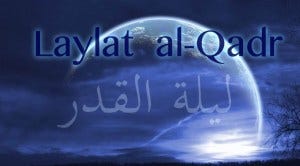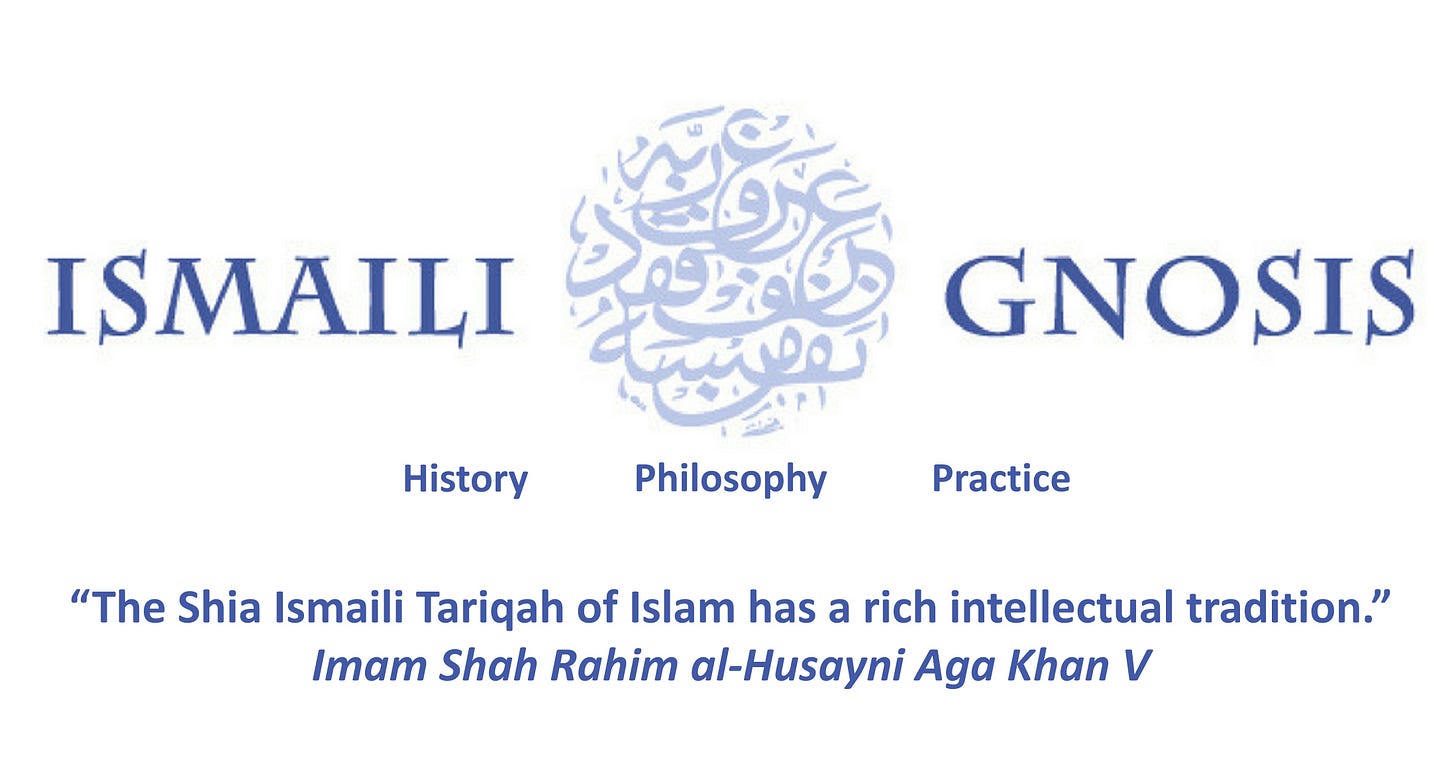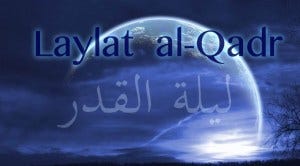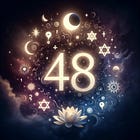Night of Power: How the Qur’an was Revealed in Human Language
According to Muslim tradition, the Prophet Muḥammad received the first revelations of the Holy Qur’ān on the Night of Power (laylat al-qadr) which is vividly described in the sūrahs below:
Verily, We sent it down in the Night of Power
And how can we tell you what is the Night of Power?
The Night of Power is greater than a thousand months.
The Angels and the Spirit descend in it by the permission of their Lord for every affair.
Peace it is, until the rising of the dawn.Surah al-Qadr – 97:1-5
Ha-Mim. By the Manifest Book
Verily, We sent it down in a Blessed Night. Verily, We are ever warning.
In it every wise affair is made clear.
A Command from our Presence. Verily, We are ever sending.
A Mercy from your Lord. Verily, He is the Hearer, the Knower.al-Dukhan – 44:1-6
The traditional interpretation holds that on the Night of Power, the entirety of the Holy Qur’ān as a Scripture including all of its chapters and verses were ‘sent down’ to the lowest heaven and that the Angel Gabriel then began dictating this ‘text’ to the Prophet Muḥammad over twenty-three years. But this is merely the exoteric interpretation which is based on subjective assumptions and not actually supported by the Qur’ān itself.
Our previous post demonstrates that on this Night, the Prophet was not merely told to “Read: In the Name of your Lord”, but rather, he was already engaged in the spiritual practice of invocation (dhikru’llāh) – alluded to in the first revelation of the Qur’ān which properly reads: “Recite the Name of your Lord” (iqrā’ bi-smi rabbika).
On the Night of Power, the Prophet Muḥammad underwent a spiritual and mystical experience. The celestial power which granted him this experience is called the Holy Spirit which – as Sūrah al-Qadr states – descended in the Night of Power:
Inna anzalnāhū fī laylati al-qadri
“Verily, We sent it/him down in the Night of Power.”Holy Qur’ān 97:1
Tanazzalu’l-malāikatu wa’l-rūḥ fīhā bi-idhn rabbihim min kulli amrin
“The Angels and the Spirit descend in it by the permission of their Lord for every affair.”Holy Qur’ān 97:4
The Qur’ān was not merely dictated to the Prophet in the form of Arabic sounds and letters. Rather, it was infused and inspired into the Prophet’s heart and soul as an immaterial and formless Holy Spirit which is itself beyond sounds, letters, and language. Sayyidnā Nasir-i Khusraw is very critical of those who presume that the Muḥammad merely heard the Qur’an in Arabic from the Angel Gabriel and then repeated it. For Nāsir and other Ismā‘īlī Muslim theosophers, the Angel Gabriel is the imaginal rank (ḥadd al-khayāl) of the Holy Spirit that inspires the soul of the Prophet as opposed to his physical ears:
“His learning of the knowledge of the higher world was done through his luminous soul (nafs-i rawshān), and not through his physical ears in the manner in which we hear.”
– Sayyidnā Nāsir-i Khusraw, (Six Chapters – Shish Fasl, transl. W. Ivanow, Chapter 5, Click Here to Read)
The Qur’ān even suggests that the Book (kitāb) revealed to the Prophet was a pure Spirit and Light as opposed to sound and letters:
Wakadhālika awḥaynā ilayka rūḥan mina amrinā mā kunta tadrī mā’l-kitāb walā’l-imānu wa lakin ja‘lnahānu nūran nahdī bihi man nashāu min ‘ibādinā wa-innaka latahdī ilā ṣiratin mustaqimin
“And that We have inspired you [Muhammad] with a Spirit from Our Command. You did not know what was the Book (kitāb) and what was the Faith. But We have made it a Light (nur) by which We guide such of our Servants as We will. And verily, you guide to a Straight Path.”
Holy Qur’ān 42:52
It should also be pointed out that the term ‘Book’ (kitāb) as used in the Qur’ān does not actually refer to ‘writing or ‘scripture’. Contemporary scholarship questions the very idea that the Qur’ān was meant to be a written Scripture:
“To understand kitāb on the level of Book or Scripture is to distort and seriously reduce its potential meaning as used in the Qur’ān. It is to impair the transparent quality of the word kitāb. According to the Qur’ān, neither Muḥammad nor any of the preceding prophets was preoccupied with Scripture, something that is written and read.”
J.W. Fiegenbaum, Prophethood from the perspective of the Qur’ān, PhD Dissertation, McGillUniversity, 153, Click Here to Read
The term Book (kitāb) as used in the Qur’ān denotes a purely spiritual knowledge of God’s will and guidance as opposed to the text of a Scripture. Sayyidnā Nāsir-i Khusraw says that the Qur’ān as it exists today reached us through a three-stage process:
First, the Holy Spirit inspires the Book (kitāb) in a spiritual form (without sounds or letters) into the heart and soul of the Prophet (and not his ears and tongue) which the Qur’ān bears witness to in the below verses:
Wa-innāhu latanzīl rabbi’l-‘ālamina
Nazala bihi’l-rūḥu’l-amīnu
‘ala qalbika litakūna mina al-mundhirīna
Bilisānin ‘arabiyyin mubīnin“And verily, it is a revelation of the Lord of the Worlds
The Faithful Spirit descended with it
Upon your heart, so that you may be of the warners
In clear Arabic language.”Holy Qur’ān 26:192-195
Secondly, the Prophet’s soul and imaginal faculty (which are divinely inspired) express the divine inspiration in the form of revealed discourse (nuṭq, tanzīl, qur’ān) consisting of parables and symbols that were drawn from the local traditions, cultures, and contexts of his life and times. The Prophet himself is an active agent in the process of revelation. The subtle distinction between the spiritual Book (kitāb) and it having been ‘sent down’ as a revealed discourse (qur’ān) is also described in the following Qur’ānic verses:
Tilka āyātu’l-kitābi’l-mubīni
Innā anzalnāhu qur’ānan ‘arabiyyan la‘allakum ta‘qilūna“These are the Signs of the Manifest Book,
Verily, We sent it down as an Arabic Qur’ān that you may intellect.”Holy Qur’ān 12:1-2
Finally, this revealed discourse or speech (nuṭq, tanzīl, qur’ān) is then recorded (in the Prophet’s own lifetime) and then codified into a formal written Scripture – which happened during the time of Uthmān, the third Caliph of Sunnī Islām.
The very idea of a written Scripture is not essential to the Qur’ān and is never mentioned in the Qur’ān except in a critical way. For example, the below verse refers to the Book of Moses as essentially ‘Light’ and ‘Guidance’ and its being ‘put on parchments’ by his community as a subsequent event:
“Say: Who revealed the Book which Moses brought, a light and guidance for mankind, which ye have put on parchments…”
Holy Qur’ān 6: 91
The Night of Power is when the first stage occurred: the entirety of Qur’an in the form Spirit and Light descended into the heart of the Prophet. This was the climax of the Prophet’s spiritual practice and training which he had been performing leading up to the Night of Power:
“When it is said that the Qur’ān was revealed all at once it means that the Prophet’s personality became Qur’ānic on the Night of Qadr. The Night of Qadr was the night on which the Prophet attained his quest. The Prophet lived an abstemious life for about 40 years and, at the age of 38 – or 40 according to some accounts – he suddenly became enlightened, like the Buddha, on a single night. He received a revelation and the veils suddenly fell away from his eyes. The Prophet saw that night, which fell in the month of Ramaḍān, as the Night of Qadr and he later gave it this name. That night was in fact his own night of destiny, the night of union, the night on which he arrived at his destination and became a prophet. It was the night on which all his asceticism and effort bore fruit. On that night, the Prophet, in effect, became Qur’ānic. In this sense, the Qur’ān was revealed to him in its entirety. He became a personality from which the Qur’ān henceforth emanated. His personality became a wealth on which he could draw for the rest of his life. Hence, this Qur’ān was revealed to the Prophet all at once.”
Abdulkarim Soroush, Islam, Revelation and Prophethood, Feb 2008, Click Here to Read
On the Night of Power, the Prophet did not merely receive the Qur’ān; the Prophet himself became the Qur’ān. His heart and soul were permanently illuminated and effaced by the Holy Spirit and the Light of the Qur’ān. Thus, the Prophet became the “speaking Qur’ān” on the Night of Power and for the next twenty-three years, he expressed, rendered and articulated the spiritual Light of the Qur’ān in the form of revealed discourse (tanzīl, qur’ān) over the next 23 years – the revealed recitation whose first verses were: “Recite the Name of your Lord who created” in reference to the spiritual ritual (see our previous post) that he had been performing during the Night of Power. This revealed Qur’ān did not become a formal text until long after the Prophet’s death, But, in his own lifetime, the Prophet Muḥammad was himself the “Speaking Book” of God who guided people to the Right Path:
“And that We have inspired you [Muhammad] with a Spirit from Our Command. You did not know what was the Book (kitāb) and what was the Faith. But We have made it a Light (nur) by which We guide such of our Servants as We will. And verily, you guide to a Straight Path.”
Holy Qur’ān 42:52
The Holy Spirit is the original spiritual reality of the revealed Qur’ān that exists today in the Arabic language. This Spirit or Light (nur) continues to inspire and descend upon the souls of the hereditary Imāms of the Prophet’s Ahl al-Bayt who succeeded him. This is precisely why the Prophet Muḥammad could say:
“I am leaving for you two weighty things and if you adhere to both of them, you will never go astray after me. They are the Book of God and my Progeny (itrat), that is my Ahl al-Bayt. The two shall never separate from each other until they return to me by the [Paradiscal] Pool.”
– Prophet Muhammad, (Saḥīḥ al-Tirmidhi, Sunan, Volume 5, 662-663, No. 328)
“Ali is with the Qur’an and the Qur’ān is with ‘Alī. They will not separate from each other until they return to me at the [Paradisal] Pool.”
– Prophet Muhammad, (al-Naysaburi, al-Mustadrak ‘ala al-Saḥīḥayn, 927, No. 4685)
These hadīths do not simply mean that Imām ‘Alī and the Ahl al-Bayt carried a copy of the Qur’ān everywhere they went. But rather, the Qur’ān always exists in the heart/soul of Imām ‘Alī and the Ahl al-Bayt by virtue of the Holy Spirit that continuously inspires them. Like the Prophet himself, the Imām is the Speaking Qur’ān and the Speaking Book of God – and this is irrespective of whether there exists a written Scripture or not. In this sense, Haḍrāt Shams-i Tabrīzī – the spiriīal master of Jalāl al-Dīn Rūmī once said:
‘‘The meaning of the Book of God is not the text, it is the man who guides. He is the Book of God; he is its verses; he is scripture.’’
– Haḍrāt Shams-i Tabrizī, (Shafique Virani, The Ismailis in the Middle Ages, 93)
The major difference between the Prophet and the Imām is that the former expresses the inspiration of the Holy Spirit in the form of symbols and parables that comprise the revealed discourse (tanzīl, qur’ān), while the latter expresses the Holy Spirit in the form of instruction (ta’līm) and inspiration (ta’yīd). The Imām Ja‘far al-Ṣādiq remarks that this Spirit is always present with the successors of the Prophet:
“Gabriel is the one who came down with revelation to the prophets, while the Holy Spirit is with them and with the Successors [Imāms], never departing from them, strengthening them and guiding them on behalf of God.”
– Imam Ja‘far al-Ṣādiq, (al-Qummi, Basā’ir al-Dajarat, 463, No. 1)
The Spirit is also the source of all spiritual enlightenment and insight. In principle, the Spirit can touch the souls of all human beings – as the forty-eighth Imām, Mawlānā Sulṭān Muḥammad Shāh, reminds us:
“…any of us, if the Holy Spirit ever present grants us that enlightenment, can, being thus blessed, have the power which Christ had.”
– Imam Sultan Muhammad Shah, (Memoirs of the Aga Khan, Chapter titled Islam: The Religion of My Ancestors, Click Here to Read)
The Night of Power is not only a night or historical occasion on which the Prophet first received revelation. In its esoteric meaning, the real Laylat al-Qadr is the spiritual rank of the Prophets and the Imāms – a perfect soul “in which the Spirit and the Angels descend for every affair” and remain ever-present. This is why Imām ‘Alī has declared:
“I am the meaning of Ramadan; I am Laylat al-Qadr mentioned in the Mother of the Book. My utterance is decisive, for I am Surah al-Hamd. I am the purpose of prayer itself, whether at home or when travelling. I am the purpose of fasting, and the sacred anniversaries in the months of the year.”
– Imām ‘Alī ibn Abī Ṭālib, (Khuṭbah al-Iftikhār, Click Here to Read)
In the universal sense, the Night of Power is the spiritual state of receptivity to the Holy Spirit – such that each seeker of gnosis can himself become the Night of Power:
“Inwardly, or esoterically, the ‘Night of Power’ is interpreted as an allusion to the very soul of the Prophet. Exoterically, the particular verses of the Qur’an are deemed to have descended ‘upon’ the heart of the Prophet (26:192-94); but esoterically the essence of the Qur’an is deemed to have descended into the heart of the Prophet. What this kind of interpretation alludes to is the spiritual power inherent in the absolute receptivity of the state of the Prophet’s soul… Applied analogically to the spiritual quest, it can be said that every soul must make itself into a kind of ‘Laylat al-Qadr’, by emptying itself of egotism and worldliness, in order to be ‘full’ of receptivity to the divine: one aims to become a vessel made empty for the influx of divine grace.”
– Reza Shah-Kazemi, (Spiritual Quest: Reflections on Qur’ānic Prayer according to the Teachings of Imam ‘Alī, 73-74, Click Here to Read)
Reading Resources:
If you do not accept the existence of God or are not sure, then read a logical argument for the existence of God here.
If you do believe in the existence of God but are unclear on the concept of God, then read this article on the concept of God according to the 48th hereditary Imam of the Ismā‘īlī Muslims.
If you do accept the existence of God but are unsure as to the existence of the immaterial human soul, then read this article for a series of philosophical arguments on the soul.
If you believe that the Prophet Muhammad was merely a deliverer of the Qur’an and nothing more, then read this article which uses the Qur’an to delineate the spiritual duties and powers of the Prophet Muhammad.
If you believe in the spiritual authority of the Prophet Muhammad and accept the Qur’an as divinely-inspired revelation, but do not accept that Muhammad had any spiritual successors, then read this article containing arguments for a manifest Imam or spiritual leader to succeed Muhammad based on the Qur’anic evidence.








